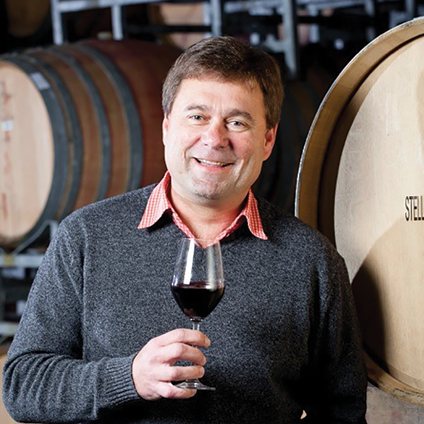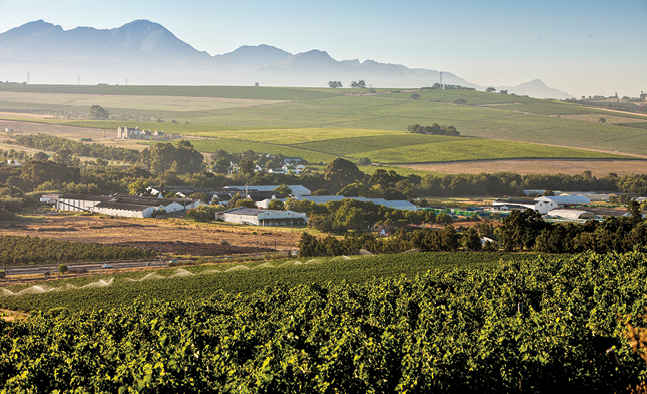


![]()
ONLINE


Eduan Steynberg
Transforming
Stellenbosch
Editors’ Note
Eduan Steynberg graduated as a Chartered Accountant with Coopers & Lybrand, then joined a division of Foodcorp. After reaching the level of Financial Director, he left to pursue a career in general management as GM of the Milling Division of Sefalana Group in Botswana. Following this, he joined Derek Brink Holdings as CEO where he managed the commercial side of the business. On his return to South Africa, he became involved in the wine industry when he joined GWK Limited. After this, Steynberg started his own business, which had a small wine component. In 2012, Steynberg joined Stellenbosch Vineyards as Managing Director and he most recently became part-owner.
Winery Brief
Stellenbosch Vineyards (stellenboschvineyards.co.za) is a wine producer and exporter with its roots in Stellenbosch, South Africa’s premier wine-producing region. It is one of the largest branded product exporters in South Africa, taking its portfolio of award-winning wines to 39 countries around the globe. Its head office is situated on Welmoed, the oldest proclaimed farm in the Stellenbosch district, with a history dating back to 1690.
What is the heritage behind this centuries-old brand?
The brand is now 350 years old, which we are really proud of. We were the first proclaimed farm in the Stellenbosch region; Stellenbosch being the heart of the wine region. The farm has since been broken into smaller parts over the years and, today, our cellar still buys from the original farm.
From our origin, we have been a cooperative and we still have 200 producers in the area. The cooperative merged with a division of the largest fruit exporter to establish wine brands across different markets. The merger of these two businesses in 2006 was the beginning of Stellenbosch Vineyards.
Historically, we’re purely a wine business essentially started by farmers and beefed up by international expertise in marketing to where we are today.

Stellenbosch Vineyards
Is the message of the history and quality of South African wines well understood?
In Europe, yes, where we have been revered for ages. But the market has been very controlled until this point. Historically, KWV was the sole exporter of wine but, since 1994, the world markets started opening up for individual producers and we have been one of the first to take advantage of this.
How do you differentiate today in such a crowded market?
The only way to differentiate is to be in touch with the consumer. The wines and wine quality, and the expectation of wine and wine quality, differs among individuals. We take the angle that we need to be communicating with our consumer. We have employed people in our key markets to attend festivals and wine events to interact with the consumers and develop a communication strategy that is one-on-one with those consumers. Our goal is to get their feedback because that is the only way you really understand how your wine is being perceived.
How has technology impacted the business?
It always requires a major investment, but we’re stepping up our game all the time, and not just in technology in terms of winemaking and viticulture, but also for business intelligence and communication with our customers and partners. Recently, we upgraded our website to optimally function on hand-held devices.
Does the technology affect the way you produce wine?
Not necessarily at this stage. It’s more in terms of style and techniques, but from an equipment point of view, we use standard equipment. It might be in how you handle the grapes but the technology hasn’t made such a big difference in terms of the wine-making itself.
Is there a larger purpose to what you do outside of the wine?
One of our key business goals is to build long-term sustainable and profitable business partnerships, so we have a responsibility to do business in a certain way that adds value not only for our stakeholders but to our country as a brand.
What were your priorities when you came on board?
My first realization was that any business needs a simple clear strategy and visual of where they want to go. As a company, we weren’t in the right space. We were competing in two or three major markets and the economic downturn in those markets had a massive impact on our business.
We had to make a simple shift from being a large exporter of entry-level wine to being one that offers a complete portfolio of wines.
We also had to change the perception of who we are and what we do. We quickly went from launching our higher tier wines to winning major competitions, which proved we are able to produce wines at the highest level. By diversifying the business, we’re moving closer to what we should be doing.
How did your focus on Fairtrade evolve?
The company is dabbling in the Fairtrade concept, similarly to what the U.S. has done with coffee. Stellenbosch Vineyards has created a product offer, which is really a brand extension of an existing line, that has played into the Fairtrade theme. This will be a bigger component of the dialogue as we enter the U.S. market because there hasn’t been an important association between the wine sector and Fairtrade previously.
We also know that we have a responsibility as a company to do business in an ethical manner. WIETA (wieta.org.za) is a new overseer that is focused on the ethics of business. They ensure that we have the right trading practices in place. In the future, all our wines will carry the Wieta seal indicating that we are an approved supplier. It is important to know that, as a big business, we adhere to international ethical standards.
What else have you been working on?
In terms of innovation, we have introduced a new concept where we offer infused wine – we use natural ingredients. The idea behind it is to lead an expanded audience into the wine category.•